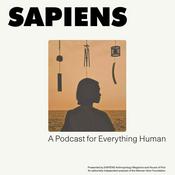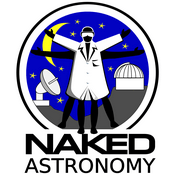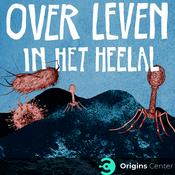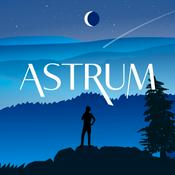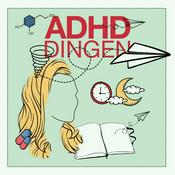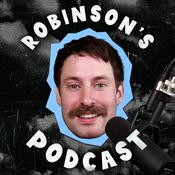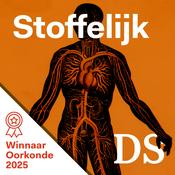25 afleveringen

Siestas & Sleepless Nights: The Science of Sleep - Part 2
26-12-2025 | 26 Min.
This episode dives into cultural sleep patterns, the science-backed benefits and timing of naps, and how circadian rhythms and so-called "sleep pressure" affect night time sleep. It also covers sex and age differences in sleep needs, the risks of too little or too much sleep, and practical sleep hygiene tips to improve sleep quality. Bibliography: Blume C, Garbazza C, Spitschan M. Effects of light on human circadian rhythms, sleep and mood. Somnologie (Berl). 2019 Sep;23(3):147-156. doi: 10.1007/s11818-019-00215-x. Epub 2019 Aug 20. PMID: 31534436; PMCID: PMC6751071. Chen, Chun-Lin et al. “Associations among sleep quality, sleep duration, and Alzheimer's disease biomarkers: A systematic review and meta-analysis.” Alzheimer's & dementia : the journal of the Alzheimer's Association vol. 21,3 (2025): e70096. doi:10.1002/alz.70096 Hudachek, Lauren, and Erin J Wamsley. “A meta-analysis of the relation between dream content and memory consolidation.” Sleep vol. 46,12 (2023): zsad111. doi:10.1093/sleep/zsad111 Dutheil, F.; Danini, B.; Bagheri, R.; Fantini, M.L.; Pereira, B.; Moustafa, F.; Trousselard, M.; Navel, V. Effects of a Short Daytime Nap on the Cognitive Performance: A Systematic Review and Meta-Analysis. Int. J. Environ. Res. Public Health 2021, 18, 10212. https://doi.org/10.3390/ijerph181910212 Cappuccio FP, D'Elia L, Strazzullo P, Miller MA. Sleep duration and all-cause mortality: a systematic review and meta-analysis of prospective studies. Sleep. 2010 May;33(5):585-92. doi: 10.1093/sleep/33.5.585. PMID: 20469800; PMCID: PMC2864873. Sabia, S., Fayosse, A., Dumurgier, J. et al. Association of sleep duration in middle and old age with incidence of dementia. Nat Commun 12, 2289 (2021). https://doi.org/10.1038/s41467-021-22354-2

Sleeping Tight and Why It Matters: The Science of Sleep - Part 1
16-12-2025 | 31 Min.
This episode explores why sleep is SUPER important for body repair, immune function, literally cleaning your brain, and protecting you from diseases like Alzheimer's. We get into some FUN topics like dreams: why we dream, whether there are any benefits to dreaming, and how sleep is different for different animals. Give it a listen, and stay tuned for part two! Bibliography: Blume C, Garbazza C, Spitschan M. Effects of light on human circadian rhythms, sleep and mood. Somnologie (Berl). 2019 Sep;23(3):147-156. doi: 10.1007/s11818-019-00215-x. Epub 2019 Aug 20. PMID: 31534436; PMCID: PMC6751071. Chen, Chun-Lin et al. “Associations among sleep quality, sleep duration, and Alzheimer's disease biomarkers: A systematic review and meta-analysis.” Alzheimer's & dementia : the journal of the Alzheimer's Association vol. 21,3 (2025): e70096. doi:10.1002/alz.70096 Hudachek, Lauren, and Erin J Wamsley. “A meta-analysis of the relation between dream content and memory consolidation.” Sleep vol. 46,12 (2023): zsad111. doi:10.1093/sleep/zsad111 Dutheil, F.; Danini, B.; Bagheri, R.; Fantini, M.L.; Pereira, B.; Moustafa, F.; Trousselard, M.; Navel, V. Effects of a Short Daytime Nap on the Cognitive Performance: A Systematic Review and Meta-Analysis. Int. J. Environ. Res. Public Health 2021, 18, 10212. https://doi.org/10.3390/ijerph181910212 Cappuccio FP, D'Elia L, Strazzullo P, Miller MA. Sleep duration and all-cause mortality: a systematic review and meta-analysis of prospective studies. Sleep. 2010 May;33(5):585-92. doi: 10.1093/sleep/33.5.585. PMID: 20469800; PMCID: PMC2864873. Sabia, S., Fayosse, A., Dumurgier, J. et al. Association of sleep duration in middle and old age with incidence of dementia. Nat Commun 12, 2289 (2021). https://doi.org/10.1038/s41467-021-22354-2

Going on a Trip: Science of Psychedelics
07-11-2025 | 36 Min.
In this episode, I explore the history, science, and clinical promise of psychedelics. This was actually my Master's Thesis topic so very fun episode for me! We cover everything from how the psychedelics actually work, by acting brain (serotonin) receptors to increase neuroplasticity (make your brain more malleable), disrupt rigid brain patterns, and increase brain "entropy"... and, more importantly, why those effects may help us treat conditions such as PTSD and treatment‑resistant depression. The episode also discusses the current clinical evidence (including a critical appraisal of its robustness), logisitcal and ethical challenges, and the importance of use within therapeutic / research settings only. As always, find a full bibliography below: Carhart-Harris & Goodwin (2017), “The Therapeutic Potential of Psychedelic Drugs: Past, Present, and Future,” Neuropsychopharmacology - This one is a very good foundation if you only have time to read one paper, it should be this one!! Yaden & Griffiths (2021), “The Subjective Effects of Psychedelics Are Necessary for Their Enduring Therapeutic Effects,” ACS Pharmacology & Translational Science - This is great to read into the question of "is the trip actually necessary?" Mitchell JM et al. MDMA-assisted therapy for severe PTSD: a randomized, double-blind, placebo-controlled Phase 3 study. Nature Medicine. 2021. Mitchell JM et al. MDMA-assisted therapy for PTSD: results of a second Phase 3 randomized trial in a diverse cohort. Nature Medicine. 2023. Carhart-Harris RL et al. Trial of psilocybin-assisted therapy versus escitalopram for major depressive disorder. New England Journal of Medicine. 2021. Davis AK et al. Effects of psilocybin-assisted therapy on major depressive disorder: outcomes at 1 and 4 weeks. JAMA Psychiatry. 2020. Raison CL et al. Psilocybin versus niacin placebo for major depressive disorder: a randomized clinical trial. JAMA Psychiatry. 2023. Bogenschutz MP et al. Psilocybin-assisted treatment for alcohol use disorder: a randomized clinical trial. JAMA Psychiatry. 2022. Griffiths RR et al. Psilocybin produces substantial and sustained decreases in depression and anxiety in patients with life-threatening cancer. Journal of Psychopharmacology. 2016. Luoma JB et al. Meta-analysis of placebo-controlled trials of psychedelic-assisted therapy. Journal of Psychoactive Drugs. 2020. Fang Y et al. Psilocybin for depressive and anxiety symptoms: systematic review and meta-analysis of randomized trials. Frontiers in Psychiatry. 2024. Romeo B et al. Safety of psychedelic-assisted therapies: systematic review and meta-analysis. Psychiatry Research. 2024. Hinkle JT et al. Adverse events in psychedelic-assisted therapy: a systematic review and pooled analysis. JAMA Psychiatry. 2024. Siegel AN et al. Persistent decreases in hippocampus-default-mode connectivity following psilocybin correlate with mood improvement. Nature. 2024. Ly C et al. Psychedelics promote structural and functional neural plasticity. Cell Reports. 2018. Carhart-Harris RL, Friston KJ. REBUS and the anarchic brain: toward a unified model of the brain action of psychedelics. Pharmacological Reviews. 2019. Griffiths RR et al. Psilocybin-occasioned mystical-type experience in humans: relationship to persisting positive effects. Psychopharmacology. 2019. U.S. Food and Drug Administration. Guidance for Industry: Expedited Programs for Serious Conditions. Drugs and Biologics (Breakthrough Therapy Designation). FDA; 2014 (update). Compass Pathways plc. Phase 3 program design of COMP360 (synthetic psilocybin) for treatment-resistant depression (TRD). Business Wire/Investor Press Release. 2024. Johnson MW, Garcia-Romeu A, et al. Pilot study of psilocybin-facilitated smoking cessation treatment: long-term follow-up outcomes. Journal of Psychopharmacology. 2017.

You will Never Forget this Episode: Science of Memory
17-10-2025 | 28 Min.
In this episode of Science Savvy, I explore how memory shapes identity and human culture. The episode covers the evolutionary origins of memory, the brain regions involved, how memories are encoded, and how therapies (including MDMA) can help heal traumatic memories. You will also get practical tips to improve your memory! About Science Savvy: My name is Carmen Fairley, I have a background in pharmacology and biomedical engineering, and currently work in medical advisory. Science Savvy is a podcast that makes cutting-edge research accessible, turning complex science into stories that mean something for you. Citations / Bibliography: Chudek, Maciej, and Joseph Henrich. “Culture-gene coevolution, norm-psychology and the emergence of human prosociality.” Trends in cognitive sciences vol. 15,5 (2011): 218-26. doi:10.1016/j.tics.2011.03.003 Brockmeier, Jens. “Memory, Narrative, and the Consequences.” Topics in cognitive science vol. 11,4 (2019): 821-824. doi:10.1111/tops.12412 Sridhar, S., et al. Cognitive neuroscience perspective on memory. PMC 2023 Markowitsch, H. J. Memory and Self–Neuroscientific Landscapes. PMC 2013 D’Argembeau, A., et al. Brains creating stories of selves: the neural basis of autobiographical reasoning. PMC 2013 Martinelli, P., et al. Neural substrates of the self‑memory system: New insights. PMC 2012 Richerson, P. J., & Boyd, R. Gene‑culture coevolution in the age of genomics. PMC 2010 Strikwerda‑Brown, C., et al. “All is not lost” – Rethinking the nature of memory and self in dementia. PMC 2019 Repetto, C., et al. The neuroscience of body memory: Recent findings and implications. PMC 2023 Dégeilh, F., et al. Neural correlates of Self and its interaction with memory in adolescence. PMC 2015 Pais‑Vieira, C., et al. The influence of self‑awareness on emotional memory. PMC 2015

Cris Cancer: Who is funding tomorrow's cancer cure?
26-9-2025 | 40 Min.
In this episode of Science Savvy, I sit down with Elena Muyo, Scientific Projects & Partnerships Lead at CRIS Cancer UK, to uncover how this unique charity is rewriting the future of cancer research. From dual CAR-T trials in children with leukemia, to a first-in-class lung cancer vaccine, to pioneering treatments for devastating childhood brain tumors, CRIS Cancer is driving science that gives patients options when medicine says “there’s nothing more we can do.” We talk about the incredible story that started it all, how CRIS selects and funds projects that others overlook, and why every pound donated has a multiplying effect on hope and discovery. If you’ve ever wondered how patient-driven science can change the course of cancer treatment, this is the episode for you. About Science Savvy: My name is Carmen Fairley, I have a background in pharmacology and biomedical engineering, and currently work in medical advisory. Science Savvy is the podcast that makes cutting-edge research accessible, turning complex science into stories that mean something for you. Citations / Bibliography: National Cancer Institute. What Is CAR T-Cell Therapy? cancer.gov Maude SL, Frey N, Shaw PA, et al. Chimeric antigen receptor T cells for sustained remissions in leukemia. New England Journal of Medicine. (also available via PMC) Fesnak AD, June CH, Levine BL. Engineering T cells: the intersection of synthetic biology and adoptive cell therapy. Nature Reviews Cancer. June CH, Sadelain M. Chimeric antigen receptor therapy. New England Journal of Medicine. Newick K, Moon E, Albelda SM. CAR T cell therapy for solid tumors. Annual Review of Medicine. Frontiers in Immunology / Frontiers in Oncology. Articles on CAR-T in solid tumors and tumor microenvironment challenges. Cancer Research UK / CRIS Cancer Foundation. LungVax project announcement. news.cancerresearchuk.org Elliott T (et al.). Details of neoantigen-based lung cancer vaccine design (as reported by CRUK) BioNTech / mRNA vaccine clinical trial reports (e.g., BNT116 in lung cancer). PMC articles / reviews on checkpoint inhibitors in lung cancer (e.g. anti‑PD‑1 / anti‑PD‑L1 therapies). Frontiers in Immunology / Frontiers in Oncology – studies combining immunotherapy in thoracic cancers, mechanisms of resistance, tumor microenvironment. National Cancer Institute / NIH press / Cancer Currents. CAR T trial in DMG. Studies on ONC201 in H3K27M mutant gliomas (e.g. University of Michigan / clinical trial reports). Reviews of prognosis and therapeutic challenges in diffuse midline glioma (e.g., clinical trial databases, Pediatric Neuro‑Oncology journals). American Cancer Society / Cancer.org. Overview of Clinical Trial Phases. Cancer Research UK. Explanation of how clinical trials work, purposes of phases I, II, III. Lupus Research / NIH / NCI / adaptive trial methodology sources. Phase I/II and Phase II/III design explanations.
Meer Wetenschap podcasts
Trending Wetenschap -podcasts
Over Science Savvy
Luister naar Science Savvy, De Universiteit van Nederland Podcast en vele andere podcasts van over de hele wereld met de radio.net-app
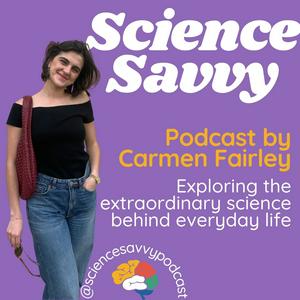
Ontvang de gratis radio.net app
- Zenders en podcasts om te bookmarken
- Streamen via Wi-Fi of Bluetooth
- Ondersteunt Carplay & Android Auto
- Veel andere app-functies
Ontvang de gratis radio.net app
- Zenders en podcasts om te bookmarken
- Streamen via Wi-Fi of Bluetooth
- Ondersteunt Carplay & Android Auto
- Veel andere app-functies


Science Savvy
download de app,
luisteren.












